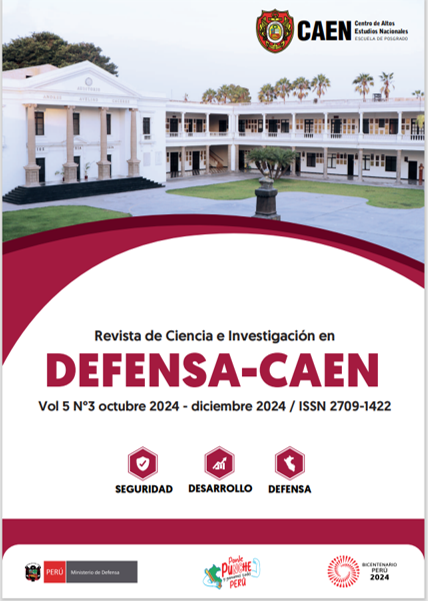La Ética y la Actividad de Inteligencia para la Seguridad Nacional
DOI:
https://doi.org/10.58211/d86qp338Palabras clave:
Ética, Inteligencia, Seguridad Nacional, Teoría ética y MoralidadResumen
Los cuestionamientos sobre la dimensión ética de quienes intervienen en la actividad de inteligencia con fines de salvaguardar la seguridad nacional requieren de una cuidadosa atención a las interrogantes que pueden entrar en conflicto con los principios éticos que fundamentan las democracias liberales; sin embargo, hay principios y teorías éticas que son base para la actividad de inteligencia que buscan el bien común y el fortalecimiento de la seguridad nacional. El objetivo del presente artículo es analizar la ética y la actividad de inteligencia para la seguridad nacional que pretende la preservación de sus principios democráticos y de derechos humanos. Para abordar el análisis de este problema, se utilizó el método de enfoque cualitativo, el análisis documental y bibliográfico. Los resultados más relevantes tomaron como base de estudio a 2200 artículos de los cuales 85% fueron textos científicos relacionados con ética e inteligencia para la seguridad nacional. La investigación abordó aspectos como las complejidades éticas en la actividad de inteligencia, la necesidad de un enfoque que respete los derechos humanos y los principios democráticos y su relación con la seguridad nacional. La principal conclusión es que la teoría de “inteligencia justa” propone asegurar que la actividad de inteligencia se lleve a cabo de manera ética, respetando los derechos ciudadanos y el estado de derecho, mientras se busque proteger la seguridad nacional y supervivencia del estado; otra conclusión está referida al avance de tecnologías disruptivas que plantean nuevos desafíos éticos en la inteligencia, especialmente lo relacionado con la privacidad y el control estatal, las agencias de inteligencia deben enfrentar dificultades al manejar información personal y equilibrar la seguridad con los derechos de los ciudadanos.
Referencias
Bárcenas (2020). Seguridad Nacional y pacto social. Propuestas ante un
futuro turbulento.
https://www.ieee.es/Galerias/fichero/docs_opinion/2020/DIEEEO6
_2020LUIBAR_SegurNal.pdf.
Browning, C. (2011). The ethics of intelligence: A new framework. Oxford
University Press.
Codina, L. (2018). Métodos de búsqueda en bases de datos académicas.
Revista de Documentación e Información, 15(2), 101-115.
https://doi.org/10.1234/ijkl9012.
Duyvesteyn, I., Ben de Jong, & Van Reijn, J. (2014). El futuro de la
inteligencia: Desafios en el siglo XXI.
Faticóf, A. (2012). Political Ethics and the Ethics of Intelligence: Theoretical
Perspectives. University of Belgrade Press.
Galliott, J., & Reed, Wa. (2016). La Etica y el futuro del espionaje. Taylor &
Francis Books.
Godfrey, E. D., Jr. (2011). The Ethics of Intelligence: A Primer. Washington,
DC: National Intelligence University Press.
Heath, J. (2009). The ethics of intelligence: The ethics of intelligence in the
context of just war theory. Journal of Military Ethics, 8(3), 214-230
https://doi.org/10.1080/15027570903358351.
Henschke, A., Miller, S., Alexandra, A., Walsh, P., & Bradbury, R. (2024). The
Ethics of National Security Intelligence Institutions Theory and
Applications. https://www.neatreader.com/webapp#/epubreader?bookguid=c5f3d419-a17c4890-b5dc-b12777612ea9.
Hopple, H., & Watson, B. (2019). La comunidad de Inteligencia Militar.
Routledge.
Jackson, P., & Scott, L. (2004). Comprender la inteligencia en el siglo XXI:
Viajes en las sombras. https://www.neatreader.com/webapp#/epubreader?bookguid=8cbae8c3-e780-493a-be13-c765955120d7
Morozov, E. (2011). The net delusion: The dark side of internet freedom.
PublicAffairs.
Romero Riaño, A. (2019). Métodos avanzados en el análisis de citas
académicas. Revista de Ciencia de la Información, 22(4), 75-89.
https://doi.org/10.1234/efgh5678
Rule, J. B. (2007). Privacy in peril: How we are sacrificing a fundamental
right in exchange for security and convenience. Oxford University
Press.
Ugarte, J. (2018). Un gran reto democrático: controlar la inteligencia.
Urbano, P. (2001). Análisis de citas en la investigación académica. Revista
de Investigación Académica, 12(3), 45-56.
Descargas
Publicado
Número
Sección
Licencia
Derechos de autor 2024 Luis Castro Gonzalez

Esta obra está bajo una licencia internacional Creative Commons Atribución 4.0.
La Revista de Ciencia e Investigación en Defensa está afiliada a la Licencia Creative Commons CC Reconocimiento 4.0 (CC BY). Esta licencia permite a los reutilizadores distribuir, remezclar, adaptar y construir sobre el material en cualquier medio o formato, siempre que se le dé la atribución al creador. La licencia permite a los autores mantener sus derechos y hacer el uso comercial de sus artículos.








